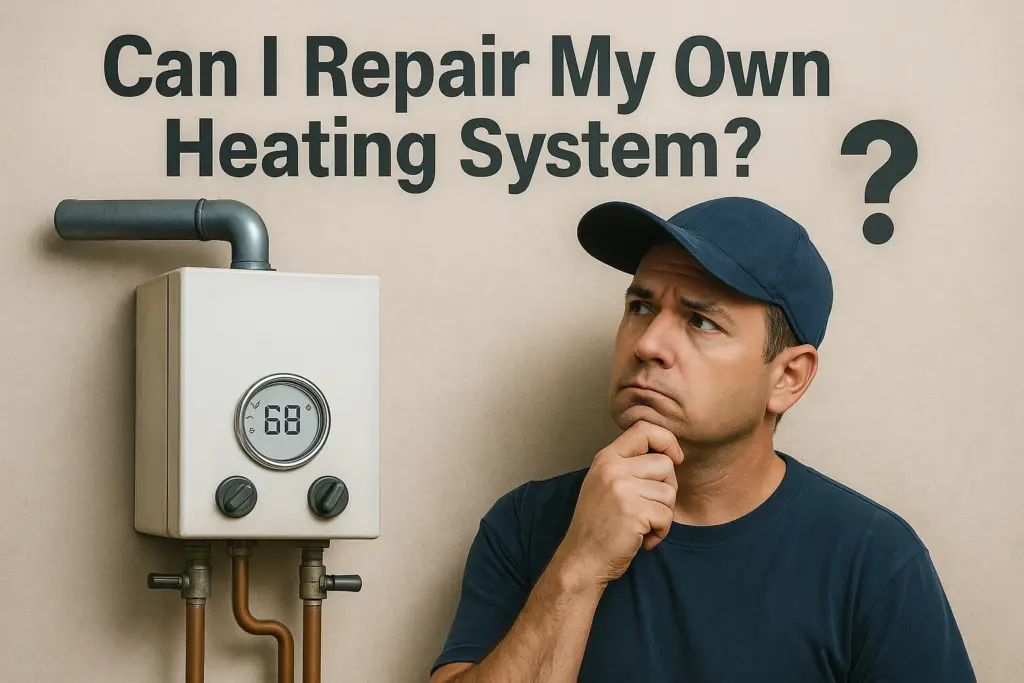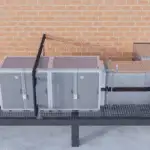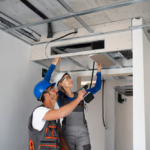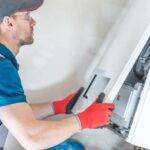As the weather gets colder, a broken heating system can make your home uncomfortable. You might wonder if you can fix it yourself or if you should get a professional. Saving money on repairs sounds good, but DIY repairs come with risks and challenges.
Before you start any repairs, check if you can handle it. Knowing the dangers and when to ask for help can save you time, money, and keep you safe.
Key Takeaways
- Understand the risks associated with DIY heating system repair.
- Assess your ability to perform repairs safely and effectively.
- Identify common issues that can be fixed without professional help.
- Know when to call a professional for complex problems.
- Consider the cost implications of DIY repairs versus hiring a professional.
Understanding Your Heating System
To manage and repair your heating system well, you need to know its parts and how it works. Your heating system has many parts that work together to warm your home.
Common Types of Home Heating Systems
There are many heating systems in homes. Knowing the differences helps you take care of yours better.
Furnaces, Boilers, and Heat Pumps
Furnaces heat air and send it through ducts. Boilers heat water or steam, which is then spread around. Heat pumps move heat from one place to another.
Central vs. Zoned Heating Systems
Central systems heat the whole house from one spot. Zoned systems heat specific areas or rooms. Zoned systems can be more energy-efficient, as they only heat what you need.
Basic Operating Principles
Knowing how your heating system works is key for keeping it running right.
How Heat Generation Works
Heat generation turns energy (from fuel or electricity) into warmth. This process changes based on your system type.
Heat Distribution Methods
After heat is made, it must get to your home. Ductwork is used for forced-air systems. Hydronic systems use radiators or baseboards.
| System Type | Heat Generation | Distribution Method |
| Furnace | Heats air | Ductwork |
| Boiler | Heats water or steam | Radiators or baseboards |
| Heat Pump | Transfers heat | Ductwork or direct |
Safety First: Before You Begin Any Repairs
Before you start fixing your heating system, remember safety first. It’s important to be ready and know the risks. This will help you have a safe and successful DIY repair.
Essential Safety Precautions
Working with heating systems means taking safety steps to avoid accidents. Be careful with electrical parts, gas lines, and carbon monoxide risks.
Electrical Safety Measures
For electrical safety, turn off your heating system’s power at the breaker or fuse box. Use a voltage tester to check the power is off. Don’t work on electrical parts when you’re tired or not focused.
Gas and Carbon Monoxide Concerns
If your system uses gas, watch out for leaks and carbon monoxide poisoning. Make sure your home is well-ventilated. Think about getting a carbon monoxide detector to warn you of dangers.
Required Tools and Protective Equipment
For safe and effective DIY repairs, you need the right tools and protective gear. This includes personal protection and basic safety tools.
Personal Protection Gear
Wear safety glasses, gloves, and a dust mask to protect yourself. Steel-toed boots can also help protect against heavy objects or tools.
Basic Safety Tools
Have a basic toolkit ready. This should include a multimeter for electrical tests, a pipe wrench for gas lines, and screwdrivers and pliers for general repairs.
Legal Considerations and Warranty Issues
Before starting DIY repairs, know the legal and warranty issues. Understand permit needs and how DIY work might affect your warranty.
Permit Requirements
Find out if you need permits for your DIY heating repairs from your local authorities. Not getting the right permits can lead to fines or problems when selling your home.
How DIY Repairs Affect Warranties
Check your heating system’s warranty to see how DIY repairs might affect it. Some warranties can be voided if you do unauthorized repairs. So, it’s key to know these rules before starting.
Can I Repair My Own Heating System? What’s DIY-Friendly
Knowing how to fix your heating system can save you money. It also keeps your system running well for longer. Learning what repairs you can do yourself is key.
Simple Maintenance Tasks Anyone Can Do
Keeping your heating system in check is important. Two easy tasks are changing filters and setting your thermostat.
Filter Replacement and Cleaning
Dirty filters hurt your system’s performance. They can make your energy bills go up and even cause system failure. Changing or cleaning your filters every 1-3 months helps a lot. As High Comfort says, “simple actions can redefine what comfort means” in your home.
Thermostat Programming and Calibration
Setting your thermostat right can cut down on heating costs. Lowering the temperature when you’re out or asleep helps a lot. Make sure your thermostat shows the real temperature in your home.
Intermediate Repairs for the Handy Homeowner
If you’re handy, you can tackle more complex tasks. This keeps your heating system running smoothly.
Blower Motor and Fan Maintenance
The blower motor and fan are key to your system. Regular checks and maintenance prevent problems. Always turn off the power before starting any repairs.
Ignition System Troubleshooting
Can’t get your system to turn on? It might be the ignition. Check the ignition source, like a pilot light or electronic ignition, to find and fix the problem.
Diagnosing Common Heating Problems
Knowing how to spot common issues helps you decide if you can fix it yourself. Or if you need a pro.
Furnace-Specific Issues
Furnace problems can be from not lighting up to uneven heating. Check the filter, gas supply, and igniter to solve these issues.
Boiler and Radiator Troubleshooting
Boiler and radiator systems can have leaks, cold spots, and failure. Bleeding radiators and looking for leaks can fix these problems.
Heat Pump Challenges
Heat pumps face issues like low airflow or not heating or cooling. Check the filter, clear the outdoor unit, and set the thermostat right to troubleshoot these problems.
Knowing what DIY repairs you can do improves your system’s efficiency and lifespan. As the saying goes,
“A stitch in time saves nine.”
Regular maintenance prevents expensive repairs later on.
When to Call a Professional
If you’re not sure about fixing your boiler, it’s best to call a professional. They have the skills and tools to handle any issue. This ensures your boiler works safely and efficiently.
Professional boiler repair services can save you time and money. They can fix problems quickly and correctly. This prevents further damage and keeps your boiler running smoothly.
Don’t hesitate to reach out to a professional if you’re unsure about DIY repairs. They can provide expert advice and fix your boiler right away. This way, you can avoid any risks and ensure your boiler is in top shape.
Preventative Maintenance to Avoid Repairs
Keeping your heating system in good shape can really cut down on repair needs. Regular maintenance ensures your system works well for years.
Seasonal Maintenance Checklist
A seasonal maintenance checklist is key for your heating system’s health. It includes tasks for each season to keep your system ready.
Fall Preparation Tasks
- Inspect and clean the furnace filter to ensure proper airflow.
- Check the thermostat to ensure it’s working correctly.
- Clear debris from around the outdoor unit.
Mid-Winter Check-ups
- Verify that the system is heating your home evenly.
- Check for any signs of leaks or damage around the system.
- Ensure that all vents are open and unobstructed.
Extending Your Heating System’s Lifespan
There are ways to make your heating system last longer, beyond just seasonal checks.
Efficiency Optimization Tips
Annual professional tune-ups can boost your system’s efficiency. They catch and fix small problems before they grow.
Component Care and Cleaning
Cleaning parts like the furnace filter and vents regularly helps your system run better and last longer.
Record-Keeping for Your Heating System
Keeping detailed records of your heating system’s maintenance and performance is very helpful. It aids in troubleshooting and ensures optimal operation.
Maintenance Logs
Keep a log of all maintenance done, including when and what was done.
Performance Tracking
Watch how your system performs over time. Note any changes or issues. This helps spot problems early.
Conclusion: Making the Right Choice for Your Home
Exploring how to fix your own heating system has prepared you to make smart choices for your home. You can fix it yourself if you know what to do and are careful. Simple tasks and some repairs are okay for DIY, but know when to get a pro to avoid big mistakes.
Knowing your heating system, being safe, and doing regular checks can make your home warm and cozy. Think about the job’s complexity, your comfort level, and the risks before deciding to DIY or call a pro. This way, you can keep your heating system working well, making your home comfortable for everyone.
Can I repair my own heating system? Yes, you can, with the right help and caution. Take charge of your home’s comfort and make smart choices about fixing and maintaining your heating system.
FAQ
Can I repair my own heating system, or should I hire a professional?
You can do simple tasks like replace filters and adjust thermostats yourself. But, for big problems like gas leaks or broken parts, get a pro.
What are the benefits of DIY heating system repair?
DIY repairs can save you money and teach you how to fix things. They also help keep your system running smoothly.
How do I know if my DIY repair will void my heating system’s warranty?
Check your warranty or call the manufacturer to see if DIY repairs are okay. Some warranties need a pro to stay valid.
What safety precautions should I take when performing DIY heating system repair?
Always turn off the power before starting. Make sure you have good air flow when working with gas systems. Wear gloves and safety glasses and follow the manual.
How can I troubleshoot common heating system problems?
First, check the thermostat and filters. Make sure air is flowing well. Look in your manual or online for specific help for your system.
What are some common mistakes to avoid when performing DIY heating system repair?
Don’t skip safety steps, use the right tools, and follow the manual. Be careful not to over-tighten or loosen connections too much.
Can I perform preventative maintenance on my heating system to avoid repairs?
Yes, cleaning filters, checking for wear, and getting seasonal checks can prevent problems. It also makes your system last longer.
How do I find a qualified HVAC technician if I need professional help?
Look for NATE or ACHR certified techs. Read online reviews, ask for recommendations, and check their licenses and insurance before hiring.




